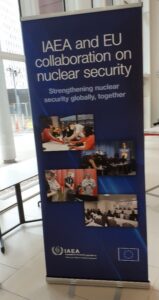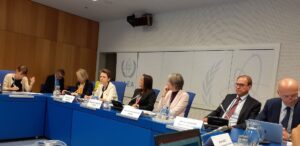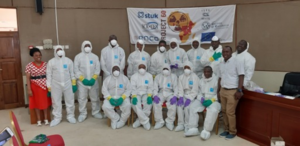ISTC participated in the EU Side Event entitled Strengthening Nuclear Security Through Capacity Building and Education, convened on 27 September 2022 during the IAEA GC 66. The objective of this event, organized by the European Union, the IAEA and the Czech Republic, was to present the  experience of the EU and the IAEA in supporting capacity building and education in nuclear security, and to showcase the nuclear security achievements of the Centre of Excellence in Eastern and Central Africa. This implied discussing the outcomes of the EU-funded, ISTC-implemented CBRN ECA CoE Project 60, which is scheduled to be completed by the end of the year.
experience of the EU and the IAEA in supporting capacity building and education in nuclear security, and to showcase the nuclear security achievements of the Centre of Excellence in Eastern and Central Africa. This implied discussing the outcomes of the EU-funded, ISTC-implemented CBRN ECA CoE Project 60, which is scheduled to be completed by the end of the year.
At the opening of the event, Ms Marjolijn van Deelen, EU Special Envoy for Disarmament and Non-proliferation, pointed out that the European Union supports systematically the capacity building efforts of the IAEA and in the current financial cycle has attributed EUR 11,6 million for such purposes. Ambassador Ivo Sramek, representing the Czech Presidency of the EU, reminded that IAEA Member States are responsible for the physical protection of nuclear material on their territory and appealed for acceptance of the voluntary Code of Conduct in that respect. Ms Elena Buglova, Director of the IAEA Division of Nuclear Security, informed that since 2007 IAEA has received from the EU cumulatively over EUR 60 million that allowed the Agency to train over seven thousand experts in nuclear security. She singled out the Marie Skłodowska-Curie Actions, the EU’s reference program for doctoral education and postdoctoral training.
 The Panel discussion was moderated by Ms Margarida Goulart from the EC Joint Research Center, Head of the EUROATOM Coordination Unit. Other EU and IAEA officials that took the floor included Mr. Jean Galy, JRC, speaking on the EU CBRN Centers of Excellence, Ms Julie Parlange, EU Activities Project Coordinator at the IAEA, and Ms Marina Labyntseva, Unit Head, Education and Training Department. The latter underlined the important role of the Nuclear Security Support Centers network, of which ISTC became a member last year.
The Panel discussion was moderated by Ms Margarida Goulart from the EC Joint Research Center, Head of the EUROATOM Coordination Unit. Other EU and IAEA officials that took the floor included Mr. Jean Galy, JRC, speaking on the EU CBRN Centers of Excellence, Ms Julie Parlange, EU Activities Project Coordinator at the IAEA, and Ms Marina Labyntseva, Unit Head, Education and Training Department. The latter underlined the important role of the Nuclear Security Support Centers network, of which ISTC became a member last year.
 At the side event the practical impact of EU funded activities was illustrated by the enhancement of nuclear security achieved by the Project 60. It brought about comprehensive improvement in nuclear security in East and Central Africa through a combination of expert assessments, provision of training, practical exercises, and development of normative frameworks. The experts from a consortium headed by ENCO focused on resolving gaps in security inspections, Emergency Response plans, and limited control over mobile sources crossing borders. In terms of capacity building the results are illustrated by the number of trainees in various courses and exercises that until this moment total 539, a quarter of them women.
At the side event the practical impact of EU funded activities was illustrated by the enhancement of nuclear security achieved by the Project 60. It brought about comprehensive improvement in nuclear security in East and Central Africa through a combination of expert assessments, provision of training, practical exercises, and development of normative frameworks. The experts from a consortium headed by ENCO focused on resolving gaps in security inspections, Emergency Response plans, and limited control over mobile sources crossing borders. In terms of capacity building the results are illustrated by the number of trainees in various courses and exercises that until this moment total 539, a quarter of them women.
Mr. Solomon Getachew, Director General, Ethiopian Technology Authority, provided the national perspective of one of the most actively participating African countries. He asserted that the skills, knowledge and experiences gained from trainings helped the regulatory authority update its inspection procedure and methodology, establish safeguards team, and harmonize the security inspections with the international standards.
Emmanuel Ampomah-Amoako, Director, Nuclear Installations, Nuclear Regulatory Authority, Ghana, pointed out that his country has benefited from Project 60 in similar ways, but also by engaging various stakeholder institutions that received training. This is essential for the implementation of the CBRN Emergency Response Plan provided by the Project.
Joseph Maina, Director General, Kenya Nuclear Regulatory Authority, who is also the Head of the Regional Secretariat of the CoE, welcomed the support by the Project for improved coordination and collaboration in nuclear security on a national scale and pleaded for greater regional cooperation, particularly on transboundary shipments of nuclear material.
In the ISTC’s Africa portfolio, Project 60 is complemented by another EU – funded project: Support for Southern African States in Nuclear Safety and Safeguards that was completed two months earlier. During the IAEA 66th General Conference ISTC discussed at a regional meeting with SADC Nuclear Regulator’s Network the sustainability of the outcomes and the possible follow ups to the Project

